‘We’re the hospital of last resort’: Inside the coronavirus wards battered by Lebanon’s economic crisis
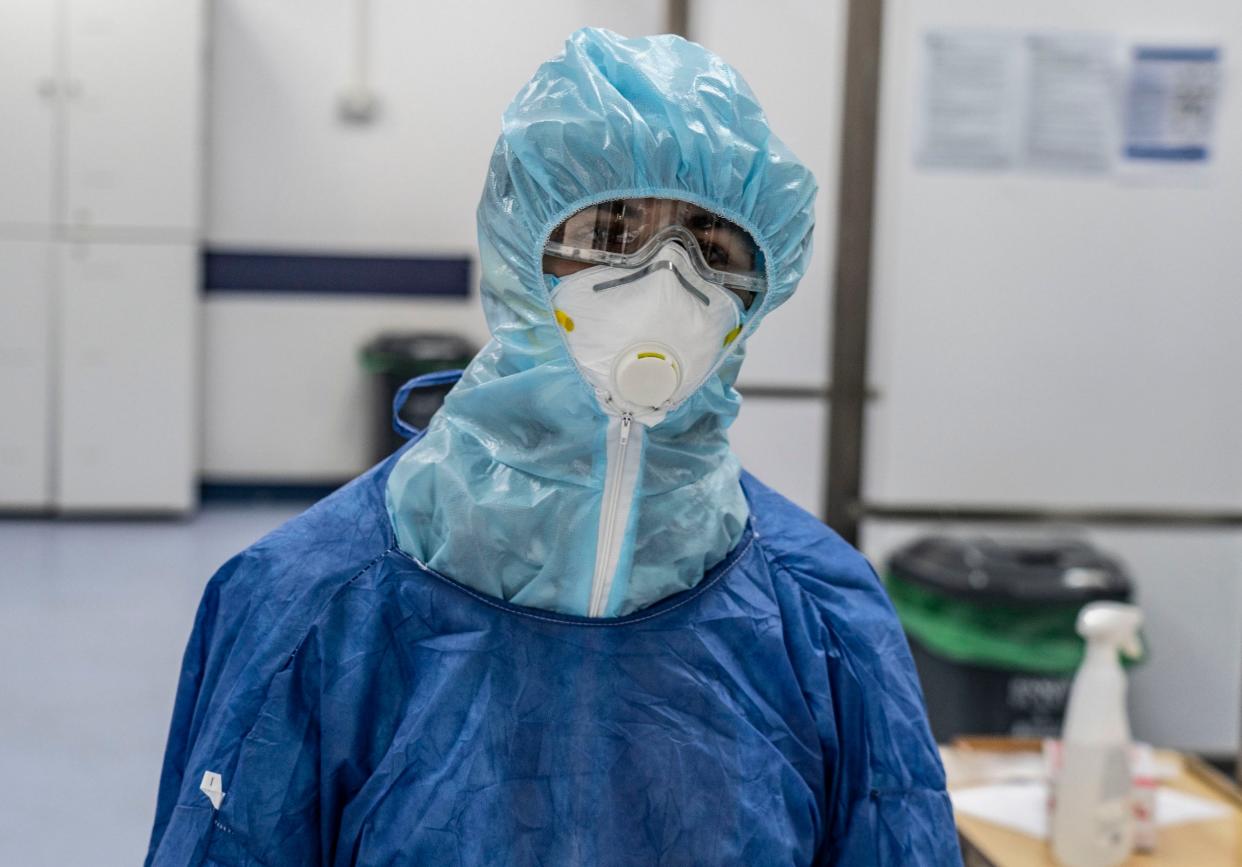
Dim through the misty pane of googles, doctors at Lebanon’s main coronavirus hospital struggle to put on layer after layer of protective fabric.
The daily process at the Rafik Hariri University Hospital ends with the snap of the second pair of latex gloves placed on each hand.
It is stiflingly hot and claustrophobic wearing the Personal Protective Equipment (PPE) that covers them head to toe.
Despite this, the dome-hooded staff with draw-strung faces shuffle efficiently around the Intensive Care Unit (ICU) administering medicine.
Many are so tired their sentences stutter to halt. Some of the nurses, now living in dorm rooms, have not been home and seen loved ones for a month. They say wearing the PPE makes them feel stiffled and sick.
Here at Lebanon’s largest public medical centre, they have lost eight patients to Covid-19. Over half of all those infected with the disease in the country has passed through their wards.
“It’s taking a psychological toll, but we are trying to adapt after a month,” says Dr. Hussain, as he enters the hot zone – an area barricaded off within the hospital for those infected with the deadly disease. Behind him a man in a mask and gown disinfects the lift.
“There are difficulties like any war, and we are living in a war of sorts.”
“But we are doing whatever we can with all our might and will, as long as you have the will you can pass through any difficulty,” he adds.
Lebanon was already teetering on the edge of economic collapse and limping through a revolution when the coronavirus pandemic raged across the world and settled on its doorstep.
The country’s massive population of refugees – the highest per capita in the world – has also piled pressure on the health authorities.
One in four people in Lebanon is a refugee. Among those is an estimated 1.5 million Syrians, as well as 460,000 UN-registered Palestinian refugees, including 30,000 who have fled from Syria since the start of the civil war.
Lebanese health officials fear social distancing is near impossible in the camps where many live-in rudimentary tents or crowded squalid neighbourhoods. The presence of just one case would spark a devastating epidemic.
So far only 500 cases and just 19 coronavirus-related deaths have been registered across the country, although with few testing kits available the true infection rate is not known.
The small outbreak is largely due to the country imposing one of the strictest lockdowns early on.
Here daily exercise outside is not permitted. The land and sea borders as well as the airports are closed bringing the country to a halt.
With little funds to import supplies for a hefty medical response, health officials say they are relying on home quarantine as one of their main lines of defence.
The financial crisis prior to the virus had already wiped out about half the value of the currency and sent prices skyrocketing.
A hard currency shortage, meanwhile, has disrupted supply lines, fuelling more inflation and poverty in the coming months.
The World Bank said before the coronavirus that 40 per cent of people in Lebanon now live under the poverty line, meaning they live on just $8 (£6.40) a day. With the lockdown in place, economists estimate the true percentage to be nearly 50 per cent.
Human Rights Watch warned this week that without a government assistance plan, or social protection system in place, millions of Lebanon’s residents are at risk of going hungry.
For the coronavirus response efforts, health officials at Rafik Hariri University Hospital (RHUH) say this translates into not having enough gowns, masks, gloves, disinfectant and ventilators, the very armour to fight this disease.
The hospital’s director-general Dr Firas Abiad told The Independent Lebanon imports nearly 100 per cent of its medical supplies, which is hard amid the dollar shortage.
He said his hospital, “the last resort for underprivileged patients”, has just 23 ventilators and ICU beds, prepared for coronavirus patients who need to be kept in special isolation. In addition, there are just 185 normal beds for those infected with the disease, but who do not need to go into intensive care.
Sitting in front of five days’ worth of PPE outfits given by the United Nations, Dr Abiad says they are now working “donation to donation” to make sure they have at least a week’s worth of supplies at any time.
“We don’t have direct access to foreign currency, as a public institution our bank account is with a Lebanese bank. But we do have direct access to foreign aid – in the form of supplies and donations and that is extremely important,” he says.
“Whether it is purchasing power of the Lebanese pound dropping or the amount of money that is available not being enough, we don’t have the liquidity to get what we need.”
“This is going to be negatively impacted by depression across the world.”
The reduction in production of PPE in places like China has caused supply shortages across the world. While a global recession has left aid agencies struggling with their own financial shortfalls.
“It is not often you are in a situation where the entire world is in a crisis,” Dr Abiad adds.
“Lebanon isn’t the top of anyone’s lists.”
Piling on the woes is the fact that Lebanese government owes this hospital over 8 billion Lebanese pounds – or $5.2 million dollars (£4.17m) – to cover costs for 2019. The government has made no payments for 2020.
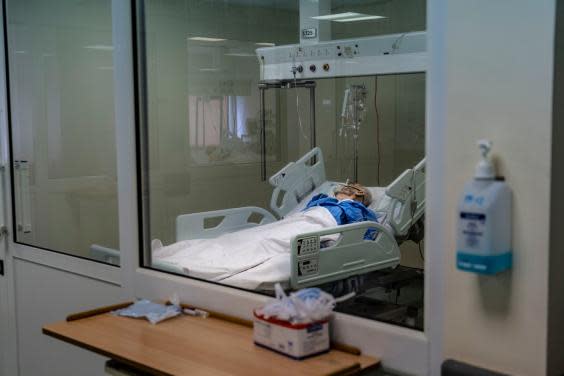
Since the pound has effectively lost half its value, even when the government does pay that money back it will have even less purchasing power than it did last year.
According to HRW the government has not reimbursed any public and private hospitals for bills, including from the National Social Security Fund and military health funds.
Sleiman Haroun, the head of the Syndicate of Private Hospitals told the New York-based watchdog the Lebanese government owes private hospitals alone an estimated US$1.3 billion in unpaid bills since 2011.
Salma Assi, the spokeswoman for the medical equipment importers, told HRW that they have not been able to import medical equipment since September due to dollar shortages, and restrictions by banks who were “playing a game of ping pong and deflecting blame.”
This has made it harder for hospitals to get hold of medical supplies, to hire additional staff to reduce the burden on overworked nurses, and provide necessary protective gear, HRW said.
The country’s new health minister Dr Hassan Hamad acknowledged the problem in an interview with The Independent.
The Hezbollah-backed appointee took office in January as part of a new cabinet, formed after former prime minister Saad Hariri resigned in October following nationwide protests against the ruling elite.
A former governor of Baalbek, Dr Hassan says he was working hard on paying back hospitals from the health ministry budget while seeking additional funds especially for the coronavirus response.
“We are facing a triple-headed challenge: First the capacity of the hospitals to accept infected people, as we lack medical equipment.
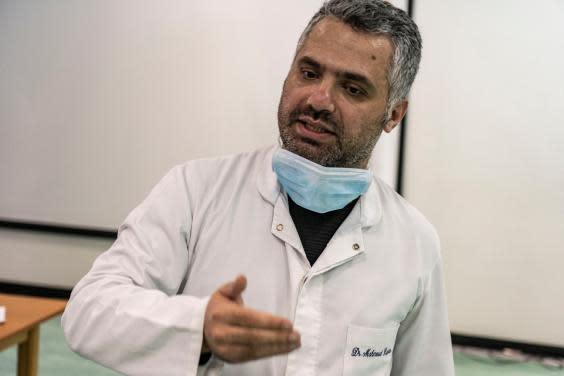
“The second is the level of income of people as poverty is increasing, we cannot expect people to isolate for long in their homes because they need money.”
“The third challenge is the refugee population and trying to coordinate plans with the United Nations,” that he says are not doing enough to help.
The minister says the country of 6.8 million people has 1250 ventilators in total for all patients and just 700 ICU beds prepared for coronavirus patients.
“The problem is in a moderate scenario of the outbreak, we need a minimum of 3000 ventilators,” he adds grimly.
Back in Rafik Hariri University Hospital, Dr Mahmoud Hassoun, head of ICU explains that means they cannot scale up their response to the crisis.
We do not have the resources to respond to a surge in infections. We will see the complete destruction of our healthcare system
Dr Mahmoud Hassoun, head of ICU at Rafiki Hariri University Hospital
“My concern is a sudden spike in cases like you saw in Italy. It would be a disaster here in Lebanon. We have a few hundred respirators for the whole country, patients will die,” he says.
“We have to remind people to do the home quarantine, it’s the best defence we have. We do not have the resources to respond to a surge in infections. We will see the complete destruction of our healthcare system,” he adds.
Wahida Ghalayini, head of the hospital’s nursing department, says her main concern was the morale of her staff.
They are working with skeleton teams as many nurses are too afraid to work with corona patients fearing infection.
So far, no medic has contracted the disease but there are fears since they are seven weeks into the crisis there will be staff infections as the teams are exhausted.
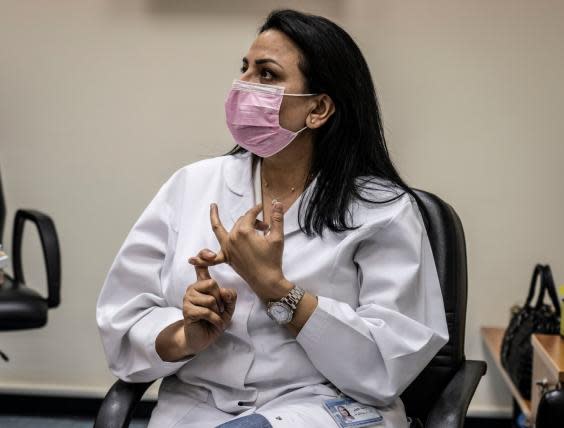
“Any mistakes will cost a lot,” she says, explaining they have put together care packages for the nurses, including fruit, honey and snacks to keep spirits up.
“We are asking too much of our staff. Many haven’t seen any member of their families in a month – they are stuck inside the hospital day and night, can you imagine?”
Outside of the hospital, there are concerns of social unrest, as the national closure piles pressure on families.
Local media reported this week that at least three people have threatened to – or succeeded in – setting themselves on fire in protest of harsh living conditions across the country.
In the northern city of Tripoli, there were prison riots on Tuesday allegedly over a promised coronavirus amnesty.
Just days before there was a reported prison breakout attempt in the eastern Bekaa Valley, over similar issues.
Experts, who blame a decade of clientelism, corruption, nepotism and patronage for Lebanon’s financial crisis, painted a bleak future as the lockdown grinds on.
They say the Lebanese state is broke, the central bank is unable to support itself anymore and many commercial banks are bankrupt although they have yet to formally declare this.
Sami Nader, an economist and director of Levant Institute for Strategic Affairs (LISA) says food will start disappearing from the shelves, prices will continue to soar, and people will go hungry.
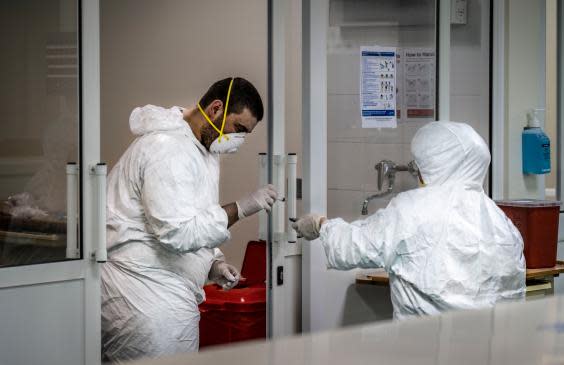
“We are falling without a parachute and we haven’t hit the ground yet,’ he says.
Maha Yahya, director of the Carnegie Middle East Centre, agreed, saying that prior to the pandemic the country needed an injection of $8 billion dollars. The virus, she adds was the “fatal blow”.
Citing World Bank figures, she says 750,000 people will slip below the acute poverty line of $5 (£4) a day – meaning won’t be able to meet their daily calorie needs.
“This is unprecedented for Lebanon,” she adds.
The government has announced aid packages including distributing 400,000 Lebanese pounds ($150, £120) to the poorest families.
It has also pledged millions of dollars for nutrition and sanitary assistance.
We are falling without a parachute and we haven’t hit the ground yet
Sami Nader, director of Levant Institute for Strategic Affairs
HRW said these payments have yet to be distributed. There are scant details.
Back in Rafik Hariri, Dr Firas says for the moment they are at 50 per cent capacity as the lockdown is working.
But he fears the “black hole” once restrictions are lifted, particularly as the country does not have enough testing kits to identify any unknown clusters.
“What gives you hope is the national participation from people [in the lockdown]. Whether we are talking about Rafik Hariri hospital or the country, the people in the end are the ones who will eventually get us through this mess,” he says.
“Money, equipment, supplies they will come. Whether or not we succeed, depends on the people coming together, that is the crux.”
Additional reporting by Samira al Azar
Read more
Inside the Lebanon refugee camps bracing for coronavirus
Turkey to become first country to distribute free masks to nation
Iran and US rivalry worsens as coronavirus ravages both nations
Hundreds die in Iran after drinking methanol as fake coronavirus cure
War-ravaged Syria, Yemen and Libya brace for coronavirus disaster
Syria confirms first coronavirus case amid accusations of coverup
We have a responsibility to protect refugees from coronavirus

